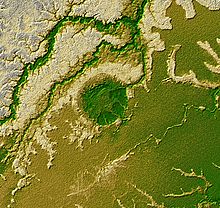Iturralde crater: Difference between revisions
Appearance
Content deleted Content added
some editing to indicate that the impact origin of the circular feature is not yet confirmed (the page also needs some references) |
m Date/fix maintenance tags |
||
| Line 1: | Line 1: | ||
[[Image:Iturralde Crater PIA03359 cropped.jpg|thumb|Topographic map]] |
[[Image:Iturralde Crater PIA03359 cropped.jpg|thumb|Topographic map]] |
||
'''Iturralde Crater''' is a 5 mile (8 kilometer) diameter circular feature in an isolated part of the [[Bolivia|Bolivian]] [[Amazon Rainforest|Amazon]], that may be an [[impact crater]]. If correct, the impact is speculated to have occurred between 11,000 and 30,000 years ago {{ |
'''Iturralde Crater''' is a 5 mile (8 kilometer) diameter circular feature in an isolated part of the [[Bolivia|Bolivian]] [[Amazon Rainforest|Amazon]], that may be an [[impact crater]]. If correct, the impact is speculated to have occurred between 11,000 and 30,000 years ago {{Fact|date=February 2007}}. |
||
Although the structure was identified on satellite photographs in the mid-1980s, its location is so remote that it has only been visited by scientific investigators twice, most recently by a team from [[NASA]]'s [[Goddard Space Flight Center]] in September 2002. |
Although the structure was identified on satellite photographs in the mid-1980s, its location is so remote that it has only been visited by scientific investigators twice, most recently by a team from [[NASA]]'s [[Goddard Space Flight Center]] in September 2002. |
||
Revision as of 00:39, 19 February 2007

Iturralde Crater is a 5 mile (8 kilometer) diameter circular feature in an isolated part of the Bolivian Amazon, that may be an impact crater. If correct, the impact is speculated to have occurred between 11,000 and 30,000 years ago [citation needed].
Although the structure was identified on satellite photographs in the mid-1980s, its location is so remote that it has only been visited by scientific investigators twice, most recently by a team from NASA's Goddard Space Flight Center in September 2002.
External links
- NASA Earth Observatory: Topographic Map of the Iturralde Structure, Bolivia
- NASA Earth Observatory: Iturralde Crater, Bolivia
- NASA: NASA Scientists determined to unearth origin of the Iteralde Crater
- ICE2002
- Google Maps
